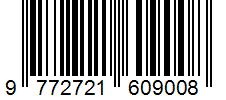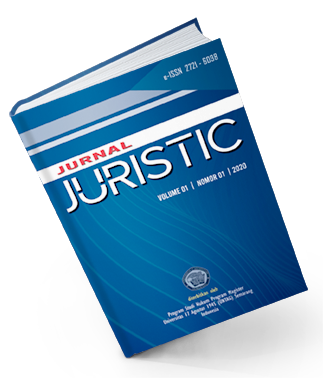Hukum dan Etika Deepfake Urgensi Regulasi Khusus atas Konten Manipulatif di Media Sosial dalam Konteks Demokrasi Digital
Sari
Kata Kunci
Teks Lengkap:
PDFReferensi
Bazarkina, Darya, Ekaterina A. Mikhalevich, Evgeny Pashentsev, and Daria Matyashova, ‘The Threats and Current Practices of Malicious Use of Artificial Intelligence in Psychological Security in China’, The Palgrave Handbook of Malicious Use of AI and Psychological Security, 2023, pp. 335–75, doi:10.1007/978-3-031-22552-9_13
Cahyadini, Amelia, Tasya Safiranita, Sherly Ayuna Putri, Josep Irvan Gilang Hutagalung, and Fahriza, ‘Adopting Pillar One: An Ideal Model for the Transformation of Indonesia’s Tax Law to Realize SDGs Goal XVII and It’s Challenges’, Cogent Social Sciences, 11.1 (2025), doi:10.1080/23311886.2025.2459321
Chakraborty, Rajat, and Ruchira Naskar, ‘Role of Human Physiology and Facial Biomechanics towards Building Robust Deepfake Detectors: A Comprehensive Survey and Analysis’, Computer Science Review, 54 (2024), doi:10.1016/j.cosrev.2024.100677
Chawki, Mohamed, ‘Navigating Legal Challenges of Deepfakes in the American Context: A Call to Action’, Cogent Engineering, 11.1 (2024), doi:10.1080/23311916.2024.2320971
Choi, Hanbyul, Choong sik Chung, and Youngmin Cho, ‘Changes in Planning Approach: A Comparative Study of Digital Government Policies in South Korea and Denmark’, European Planning Studies, 31.5 (2023), pp. 905–24, doi:10.1080/09654313.2022.2132787
Choi, Won Geun, and Min Hee Jeong, ‘Refugee Protection and the Role of Civil Society: A Comparative Study of Japan and South Korea’, Pacific Review, 2024, doi:10.1080/09512748.2024.2428338
Cupać, Jelena, Hendrik Schopmans, and İrem Tuncer-Ebetürk, ‘Democratization in the Age of Artificial Intelligence: Introduction to the Special Issue’, Democratization, 31.5 (2024), pp. 899–921, doi:10.1080/13510347.2024.2338852
Garon, Jon M, ‘WHEN Al GOES TO WAR: CORPORATE ACCOUNTABILITY FOR VIRTUAL MASS DISINFORMATION, ALGORITHMIC ATROCITIES, AND SYNTHETIC PROPAGANDA’, Northern Kentucky Law Review, 94.2 (2022), pp. 181–234
Gonzales, Nicholas Hernan, Albert Louis Lobian, Federigo Matthew Hengky, Muhammad Rendra Andhika, Said Achmad, and Rhio Sutoyo, ‘Deepfake Technology: Negative Impacts, Mitigation Methods, and Preventive Algorithms’, in 8th International Conference on Recent Advances and Innovations in Engineering: Empowering Computing, Analytics, and Engineering Through Digital Innovation, ICRAIE 2023, 2023, doi:10.1109/ICRAIE59459.2023.10468370
Hasani, Anesa, Jawad Rasheed, Shtwai Alsubai, and Shkurte Luma-Osmani, ‘Personal Rights and Intellectual Properties in the Upcoming Era: The Rise of Deepfake Technologies’, Lecture Notes in Networks and Systems, 1036 LNNS (2024), pp. 379–91, doi:10.1007/978-3-031-62881-8_32
Heidari, Arash, Nima Jafari Navimipour, Hasan Dag, and Mehmet Unal, ‘Deepfake Detection Using Deep Learning Methods: A Systematic and Comprehensive Review’, Wiley Interdisciplinary Reviews: Data Mining and Knowledge Discovery, 14.2 (2024), pp. 1–45, doi:10.1002/widm.1520
Horak, Sven, and Yuliani Suseno, ‘Informal Networks, Informal Institutions, and Social Exclusion in the Workplace: Insights from Subsidiaries of Multinational Corporations in Korea’, Journal of Business Ethics, 186.3 (2023), pp. 633–55, doi:10.1007/s10551-022-05244-5
Jin, Yulu, and Yu Wang, ‘Reassessing Smart City Development and Personal Data Protection: A Regulatory Framework’, International Review of Economics and Finance, 99 (2025), doi:10.1016/j.iref.2025.104022
Kingra, Staffy, Naveen Aggarwal, and Nirmal Kaur, ‘Emergence of Deepfakes and Video Tampering Detection Approaches: A Survey’, Multimedia Tools and Applications, 82.7 (2023), pp. 10165–209, doi:10.1007/s11042-022-13100-x
Åabuz, Mateusz, and Christopher Nehring, ‘On the Way to Deep Fake Democracy? Deep Fakes in Election Campaigns in 2023’, European Political Science, 23.4 (2024), pp. 454–73, doi:10.1057/s41304-024-00482-9
Liagusha, Anton, and Dmytro Iarovyi, ‘Memes, Freedom, and Resilience to Information Disorders: Information Warfare between Democracies and Autocracies’, Social Sciences and Humanities Open, 11 (2025), doi:10.1016/j.ssaho.2024.101247
Masood, Momina, Mariam Nawaz, Khalid Mahmood Malik, Ali Javed, Aun Irtaza, and Hafiz Malik, ‘Deepfakes Generation and Detection: State-of-the-Art, Open Challenges, Countermeasures, and Way Forward’, Applied Intelligence, 53.4 (2023), pp. 3974–4026, doi:10.1007/s10489-022-03766-z
Matli, Walter, ‘Extending the Theory of Information Poverty to Deepfake Technology’, International Journal of Information Management Data Insights, 4.2 (2024), p. 100286, doi:10.1016/j.jjimei.2024.100286
Mishra, Shubha, Piyush Shukla, and Ratish Agarwal, ‘Analyzing Machine Learning Enabled Fake News Detection Techniques for Diversified Datasets’, Wireless Communications and Mobile Computing, 2022 (2022), doi:10.1155/2022/1575365
Neyazi, Taberez Ahmed, Arif Hussain Nadaf, Khai Ee Tan, and Ralph Schroeder, ‘Does Trust in Government Moderate the Perception Towards Deepfakes? Comparative Perspectives from Asia on the Risks of AI and Misinformation for Democracy’, Government Information Quarterly, 41.4 (2024), p. 101980, doi:10.1016/j.giq.2024.101980
Öhman, Carl, ‘The Identification Game: Deepfakes and the Epistemic Limits of Identity’, Synthese, 200.4 (2022), pp. 1–19, doi:10.1007/s11229-022-03798-5
Pandian, Harpith, and Nisha Rawindaran, ‘Redefining Reality in Political Propaganda: Exploring the Impact of Superimposed Deepfakes in Misinformation Campaigns’, Data Protection: The Wake of AI and Machine Learning, 2025, pp. 47–61, doi:10.1007/978-3-031-76473-8_3
Pashentsev, Evgeny, ‘The Malicious Use of Deepfakes Against Psychological Security and Political Stability’, The Palgrave Handbook of Malicious Use of AI and Psychological Security, 2023, pp. 47–80, doi:10.1007/978-3-031-22552-9_3
Pawelec, Maria, Deepfakes and Democracy (Theory): How Synthetic Audio-Visual Media for Disinformation and Hate Speech Threaten Core Democratic Functions, Digital Society (Springer International Publishing, 2022), I, doi:10.1007/s44206-022-00010-6
Pranay Kumar, BV, MD Shaheer Ahmed, and Manchala Sadanandam, ‘Designing a Safe Ecosystem to Prevent Deepfake-Driven Misinformation on Elections’, Digital Society, 3.2 (2024), doi:10.1007/s44206-024-00107-0
Samoilenko, Sergei A., and Inna Suvorova, ‘Artificial Intelligence and Deepfakes in Strategic Deception Campaigns: The U.S. and Russian Experiences’, The Palgrave Handbook of Malicious Use of AI and Psychological Security, 2023, pp. 507–29, doi:10.1007/978-3-031-22552-9_19
Van der Sloot, Bart, and Yvette Wagensveld, ‘Deepfakes: Regulatory Challenges for the Synthetic Society’, Computer Law & Security Review, 46 (2022), p. 105716, doi:10.1016/j.clsr.2022.105716
Sulistianingsih, Dewi, Alviona Anggita Rante Lembang, Yuli Prasetyo Adhi, and Muchammad Shidqon Prabowo, ‘Online Dispute Resolution: Does the System Actually Enhance the Mediation Framework?’, Cogent Social Sciences, 9.1 (2023), doi:10.1080/23311886.2023.2206348
Tafaj, Flutura Kola, and Silvana Çinari, ‘Annulment of Arbitral Awards Rendered in Albania: Trends and Challenges’, European Union and Its Neighbours in a Globalized World, 20 (2025), pp. 87–104, doi:10.1007/978-3-031-76345-8_6
Valderrama Barragán, MatÃas, Martin Tironi, Dusan Cotoras, Teresa Correa, Mónica Humeres, and Claudia López, ‘From Industry Hype to Emerging Criticism: Analysing Chilean News Media Coverage of Artificial Intelligence’, Digital Journalism, 2025, doi:10.1080/21670811.2025.2450624.
DOI: http://dx.doi.org/10.56444/jrs.v%25vi%25i.6156
Refbacks
- Saat ini tidak ada refbacks.
Publishing Office :
Terindeks :






View Jurnal JURISTIC Stats





